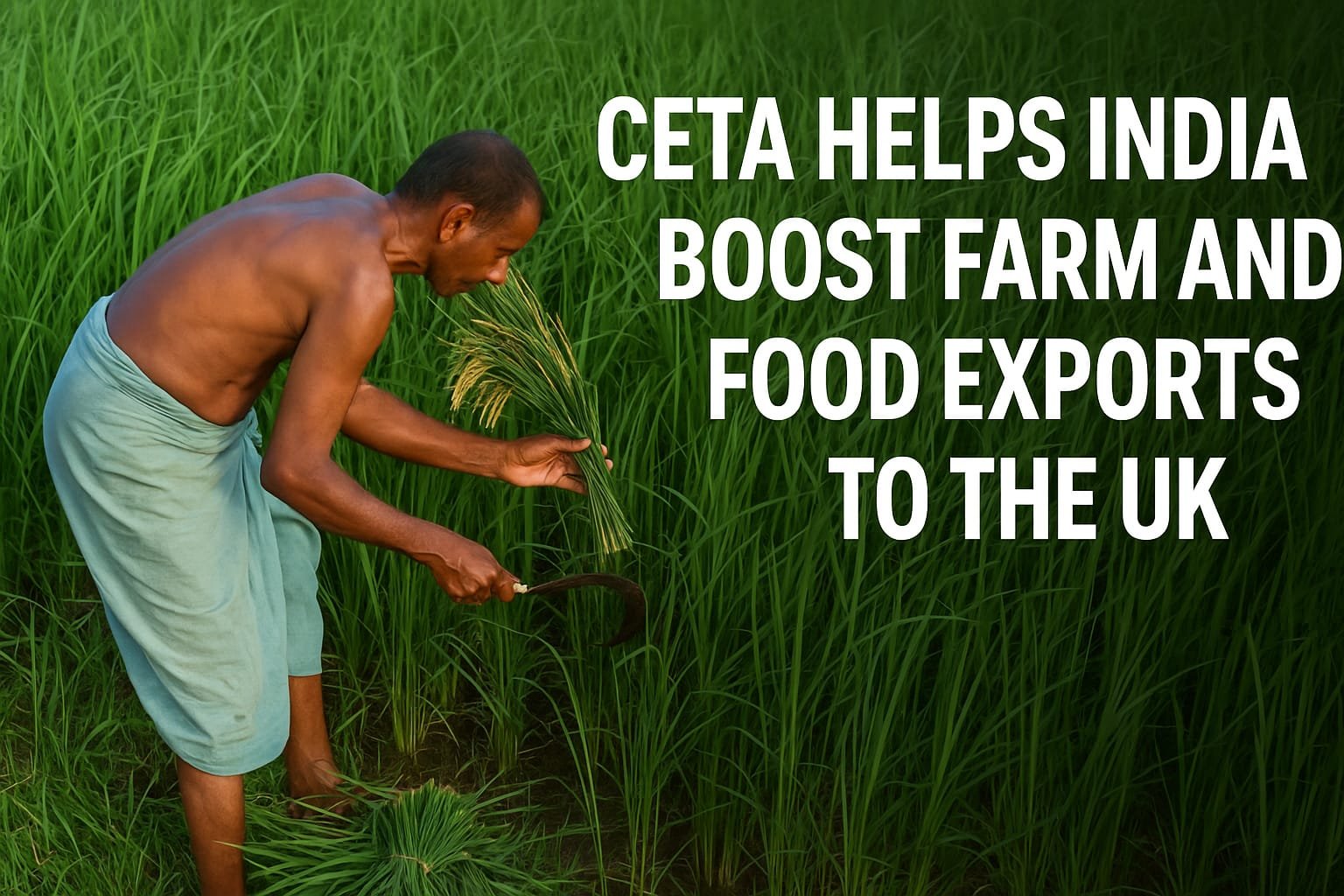
India’s agricultural and food exports are getting a big push thanks to a new trade agreement with the United Kingdom. The India-UK free trade pact known as the Comprehensive Economic Partnership Agreement or CETA is making Indian products cheaper and more attractive in the British market. This agreement is already showing results. In the financial year 2023 to 2024, India exported agricultural goods worth 875 million dollars to the UK. This number is expected to grow even higher now that many tariffs and duties have been removed or reduced.
Earlier, several Indian farm items faced very high import taxes in the UK. For example, basmati rice used to have a duty of 70 percent. Now the UK will allow this popular Indian export with zero duty on 99.97 percent of tariff lines. This includes a large share of Indian food products. Some of the key items covered are rice, spices, tea, fresh fruits and vegetables, edible oils, and processed foods.
The agreement has also made it easier for Indian exporters to send their goods to the UK. Many British supermarkets and food companies are now exploring Indian markets more actively. Indian companies are also seeing this as an opportunity to expand their operations in the UK. Experts believe this agreement will help Indian farmers and food producers by opening up a high-paying and large market.
According to the Agricultural and Processed Food Products Export Development Authority or APEDA, India exported over 2.2 billion dollars worth of farm and food products to European Union countries in 2023 to 2024. Out of this, exports to the UK made up around 40 percent. That means the UK is one of the biggest buyers of Indian food in Europe. With the new trade deal in place, this number is expected to grow faster.
One of the major advantages of this deal is that it allows Indian goods to enter the UK market at lower prices. This is important because many other countries also export similar products to Britain. By reducing tariffs, Indian goods now have a price advantage. For instance, Indian spices and tea will now compete more easily with products from Sri Lanka and African countries. Also, Indian processed foods like ready-to-eat curries, pickles, and snacks will become more popular in British stores.
Many Indian food companies are now preparing to increase their production. They see this agreement as a chance to earn more revenue and create jobs. Some companies are even planning to set up food processing units in special export zones. This will help meet the rising demand from the UK and ensure quality control. The government is also encouraging this move by offering support through APEDA and other export bodies.
Another benefit of CETA is that it allows better cooperation between Indian and UK food safety agencies. This means Indian exporters will face fewer challenges when trying to meet British quality standards. Indian products will also be promoted as safe and healthy options for British consumers. This is especially important in a market where people are very careful about what they eat.
The agreement is also expected to benefit Indian farmers directly. When food companies earn more by exporting, they are likely to pay better prices to the farmers who supply them. This will help increase farmers’ income and improve their living standards. In many cases, Indian farmers are already switching to high-value crops like organic vegetables, spices, and fruits because of growing export demand.
Data shows that India exported 1.75 billion dollars worth of rice in 2023 to 2024 to the UK alone. Spices and tea made up another 650 million dollars. The value of Indian fresh fruits and vegetables exported to the UK stood at 270 million dollars. These numbers are likely to go up by 20 percent or more this year because of the reduced import taxes.
Indian dairy products and seafood are also seeing a rise in exports to the UK. Previously, these items faced health and safety-related hurdles. Now, with better cooperation between the two governments, such issues are being addressed faster. For example, Indian shrimps and prawns, which are popular in British restaurants, have now become more competitive in terms of price.
Experts believe that the biggest benefit of this trade agreement will be felt in rural India. Small and medium-sized farms that grow rice, spices, or fruits will find more buyers abroad. This will not only bring in more foreign currency but also improve the overall economy of farming regions.
To ensure that Indian exporters take full advantage of the new agreement, the government is also launching training programs. These will help exporters learn about UK food safety rules, labeling requirements, and marketing strategies. Exporters will also be trained on how to package their products better so they appeal more to British customers.
Trade experts say the agreement will help India compete with other food-exporting countries like Vietnam, Thailand, and Brazil. Since the UK is one of the richest consumer markets in the world, having easy access to it is a big opportunity. Also, with Brexit, the UK is no longer tied to the rules of the European Union. This gives countries like India more chances to create special deals and gain market share.
The future looks bright for India’s agricultural and food export industry. With the help of CETA, Indian products are reaching new households across the UK. More British families are now enjoying Indian rice, curries, and snacks. At the same time, Indian farmers and producers are earning more for their efforts. If this trend continues, the CETA agreement could become a model for similar deals with other countries.
This is a win-win situation for both India and the UK. While British consumers get access to high-quality Indian food at affordable prices, Indian producers find new markets and better income. As both countries continue to build on this agreement, the ties between Indian farms and British kitchens are only set to grow stronger.





















